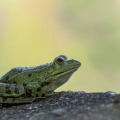Wildlife Habitat Education Program (WHEP)
The National 4-H Wildlife Habitat Education Program (WHEP) teaches youth the fundamentals of wildlife ecology and management. Wildlife has great appeal for young people and can be a mechanism to further involve them in appreciating, understanding, and conserving our nation’s natural resources.
Recent research has shown that when young people spend time in the outdoors, they benefit mentally as well as physically. When these benefits are coupled with essential life skills such as oral and written communication, critical thinking, teamwork, and decision making—skills WHEP develops—you’ll understand why this conservation education program has won national awards!
Components of WHEP
Wildlife Identification and Knowledge
- Understand basic ecological concepts
- Identify wildlife and fish species
- Demonstrate knowledge of wildlife biology and behavior (habitat and food needs)
Wildlife Management Practices
- Evaluate habitat
- Make land management recommendations
Management Plan
- Develop, write, and present a wildlife management plan
How to Get Started
To get started in WHEP, contact your county Extension office and ask for information about the WHEP program.
Since this is a 4-H program, all participants in WHEP will need to be 4-H members to be eligible to compete in WHEP contests. 4-H’ers can participate as individuals or in teams of three or four; two teams per county are allowed. Contests are held during Project Achievement Days for junior 4-H’ers (ages 8 - 14) and during Club Congress for senior 4-H’ers (ages 14 - 18). Your Extension agent can provide these dates and tell you about any training sessions to help you learn more about implementing the program. These sessions are beneficial but not crucial to forming a successful WHEP team.
Once you have this information, get a copy of the Wildlife Habitat Evaluation Program: A Manual for Mississippi; recruit young people interested in conservation, go outdoors, and start studying and having fun.
Publications
News
Two conservation camps this summer offer students in grades six through 12 the opportunity to gain hands-on experience in wildlife science, outdoor recreation and conservation careers. Conservation Camp 2022 has a residential edition June 5-8 for rising eighth through 12th graders. The day camp edition is June 13-15 for rising sixth through eighth graders.
Armadillos are one of the most unique looking critters out there. These animals are covered in silver, armor-like plates that protect them The word “armadillo” actually means “little armored one” in Spanish!
Is it a frog or a toad? If you stumbled on this amphibian, would you be able to call it by its correct name? Many people believe that frogs and toads are two different types of amphibians. Technically, a toad is a type of frog! At first glance, they may appear very similar but there are a few differences that will help distinguish one from the other.
Success Stories
The DeSoto County Board of Supervisors, led by Board President Lee Caldwell and Vice President Jessie Medlin, is developing a site to house the DeSoto County Agri-Education Center and Arena.
If a kid can be a modern-day Renaissance man, 4-H member Krishton “Kris” Johnson of Jackson fits the bill.
Mississippi 4-H Introduces New Youth Leadership Positions
Administrators with the Mississippi State University Extension Center for 4-H Youth Development recently announced two new offices for 4-H’ers: president-elect and past president. These new positions will allow the 4-H’ers more training and opportunities, state leaders agree.







